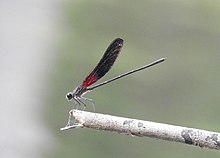Hetaerina titia, the smoky rubyspot, is a species of broad-winged damselfly in the family Calopterygidae. It is found in Central America and North America.[2][3][1][4]
| Hetaerina titia | |
|---|---|

| |
| Scientific classification | |
| Domain: | Eukaryota |
| Kingdom: | Animalia |
| Phylum: | Arthropoda |
| Class: | Insecta |
| Order: | Odonata |
| Suborder: | Zygoptera |
| Family: | Calopterygidae |
| Genus: | Hetaerina |
| Species: | H. titia
|
| Binomial name | |
| Hetaerina titia (Drury, 1773)
| |
The IUCN conservation status of Hetaerina titia is "LC", least concern, with no immediate threat to the species' survival. The population is stable. The IUCN status was reviewed in 2018.[1][5][6]
Description
editA large damselfly, varying from 1.5 to 2.0 inches for both genders. The male is black-reddish. The abdomen is black. The black wings have large red spots near the body. The coloration of the wings varies from nearly clear to smoky black. The female is more greenish than the male. The abdomen varies from green to dark brown. The wings also may have tiny white stigmas (near tips of wings). [7]
References
edit- ^ a b c Paulson, D.R. (2018). "Hetaerina titia". IUCN Red List of Threatened Species. 2018: e.T51293970A65836654. doi:10.2305/IUCN.UK.2018-1.RLTS.T51293970A65836654.en. Retrieved 13 November 2021.
- ^ "Hetaerina titia Report". Integrated Taxonomic Information System. Retrieved 2019-09-24.
- ^ "Hetaerina titia". GBIF. Retrieved 2019-09-24.
- ^ "Hetaerina titia species Information". BugGuide.net. Retrieved 2019-09-24.
- ^ "Odonata Central". Retrieved 2019-07-02.
- ^ "World Odonata List". Slater Museum of Natural History, University of Puget Sound. 2018. Retrieved 2019-07-02.
- ^ "Wisconsin Odonata Survey". Retrieved 2024-11-13.
Further reading
edit- Kalkman, V. J. (2013). Studies on phylogeny and biogeography of damselflies (Odonata) with emphasis on the Argiolestidae (PhD). Leiden University. hdl:1887/22953.
External links
edit- Media related to Hetaerina titia at Wikimedia Commons
